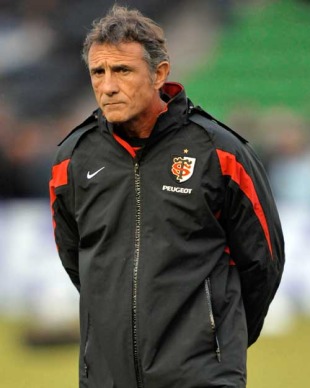|
Comment
A life without Noves
Ian Moriarty
April 27, 2010

The great Guy Noves, still going strong with Toulouse
© Getty Images
Enlarge
In a week when speculation over Manchester United supremo Alex Ferguson's retirement plans reached fever pitch, it was interesting to note the somewhat bedraggled appearance of his rugby alter ego on Saturday. What would European rugby, and by extension, Toulouse, be like without the great Guy Noves? They would be dark days indeed. The southern French superpower, based deep in the Midi, have provided much of the glamour, pomp and circumstance over the Heineken Cup's 15-year history, in addition to frequent visits to the winners circle. At the heart of the story has been the iconic figure of Noves. His two-decade stewardship has brought unsurpassed success, to the tune of seven French Championships and a record three Heineken Cups. Yet he's also been a pole of stability at the club in a time when the sands of the rugby landscape have shifted inexorably towards a brave new world. Just as the game of rugby union has changed in recent years, so too has the ancient city of Toulouse, with the city's economic success playing a major role in driving rugby union in the region. But while the club has become a byword for success in the last 20 years, they also endured years in the shadow of less illustrious neighbours, such as Beziers, Lourdes and Agen. The rise of the club in the 1980s under the direction of then president Jean Fabre and his rugby philosopher Pierre Villepreux was the rousing of a sleeping giant. That their apprentice Noves brought the club to greater heights was, with the luxury of hindsight, no accident. The question mark over French clubs' ambivalence towards the European project has been well documented over the years but there can be no doubt that the competition has always had a special place in the hearts of Noves and Toulouse in general. They were of course, winners of the inaugural competition back in 1996 but Toulouse's interest in a 'European Cup' was formulated through the 1980s. The 1986 'Masters' series, the first decent stab at a World Club Championship was an initiative of the club and was organised with the backing of some prestigious financial partners. The FFR, under the dictatorial 'reign' of Albert Ferrasse at the time, were suitably unimpressed with Toulouse's attempts at pushing an international club competition but the tides of professionalism were already lapping the shore. Toulouse's position as the cradle of French rugby and its post-war economic transformation from rural backwater to Europe's largest aerospace and aviation hub meant that there was no shortage of firms willing to take a punt on the club and the direction in which rugby was going. "At Toulouse in those days there were two major projects at work," recalls Villepreux, who now lives in Limoges in central France. "Monsieur Fabre was a visionary in many ways and saw two projects. First, there was the project in terms of the club and the organisation. Then there was my side - the project in terms of the type of rugby we wanted to play." From those relatively humble beginnings the overall philosophy of the Toulouse we know today was formed. There was the commercial partnerships and the ability to stand on one's own two feet without a 'sugar-daddy'. The foundation of the academy and a network of scouts throughout the Midi. The creation of a rugby philosophy. All these tenets combined served to create what the club has become today; lean through competition at the highest level but always hungry for more. "In the mid-80s, none of the players were paid but all of them were professional," adds Villepreux. "Everyone knew what they had to do. There was a time before when the coaching and selection of the team was left up to the captain. Toulouse wasn't like that." It was a formula that was ahead of its time. In the mid-nineties - the dawn of professionalism - the club of Fabre and Villepreux was already years ahead of their nearest rivals. This weekend, in front of 37,000, Toulouse will take on defending champions Leinster in a game that either could win. Toulouse no longer has the biggest turnover of a French club, nor the biggest average attendance (that prize goes to Stade Francais with 30,000). Yet no-one could argue that they are falling behind. Indeed, the club seems to have found the balance between the business of rugby and rugby itself, something which many clubs have hitherto struggled with in the last decade. Once more this weekend, although no doubt aided by the home draw, Toulouse are the bookies' favourites for the competition. Granted, they may not win, but they will entertain and European rugby would be the poorer without them. I for one will be doffing my beret in honouring their achievements. © Scrum.com
|
Live Sports
Communication error please reload the page.
-
Football
-
Cricket
-
Rugby
-
- Days
- Hrs
- Mins
- Secs
F1 - Abu Dhabi GP
Abu Dhabi Grand Prix December 11-131. Max Verstappen ()
2. Valtteri Bottas (Mercedes)
3. Lewis Hamilton (Mercedes)
4. Alexander Albon ()
5. Lando Norris ()
6. Carlos Sainz Jr ()
-
ESPNOtherLive >>
Boxing - Nelson v Wilson; Simmons v Dickinson; Joshua v Gavern (Metro Radio Arena, Newcastle)
Golf - Houston Open
Snooker - China Open
Tennis - Miami Open

